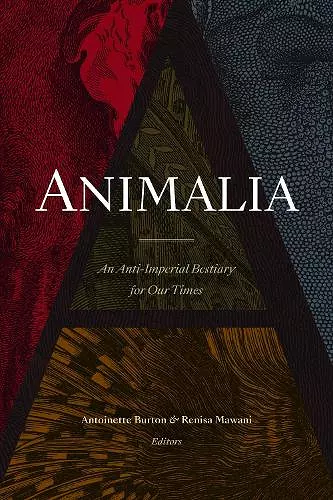Animalia
An Anti-Imperial Bestiary for Our Times
Antoinette Burton editor Renisa Mawani editor
Format:Hardback
Publisher:Duke University Press
Published:6th Nov '20
Currently unavailable, and unfortunately no date known when it will be back
This hardback is available in another edition too:
- Paperback£20.99(9781478011286)

From yaks and vultures to whales and platypuses, animals have played central roles in the history of British imperial control. The contributors to Animalia analyze twenty-six animals—domestic, feral, predatory, and mythical—whose relationship to imperial authorities and settler colonists reveals how the presumed racial supremacy of Europeans underwrote the history of Western imperialism. Victorian imperial authorities, adventurers, and colonists used animals as companions, military transportation, agricultural laborers, food sources, and status symbols. They also overhunted and destroyed ecosystems, laying the groundwork for what has come to be known as climate change. At the same time, animals such as lions, tigers, and mosquitoes interfered in the empire's racial, gendered, and political aspirations by challenging the imperial project’s sense of inevitability. Unconventional and innovative in form and approach, Animalia invites new ways to consider the consequences of imperial power by demonstrating how the politics of empire—in its racial, gendered, and sexualized forms—played out in multispecies relations across jurisdictions under British imperial control.
Contributors. Neel Ahuja, Tony Ballantyne, Antoinette Burton, Utathya Chattopadhyaya, Jonathan Goldberg-Hiller, Peter Hansen, Isabel Hofmeyr, Anna Jacobs, Daniel Heath Justice, Dane Kennedy, Jagjeet Lally, Krista Maglen, Amy E. Martin, Renisa Mawani, Heidi J. Nast, Michael A. Osborne, Harriet Ritvo, George Robb, Jonathan Saha, Sandra Swart, Angela Thompsell
“Animalia shows us how imperial power was both extended through and disturbed by the multiple entanglements of human/animal worlds. The elephants, lions, and tigers familiar to the imperial imagination jostle with mosquitoes, scorpions, and unicorns, offering a rich variety of animal engagements with empire, both for and against their would-be masters. An essential bestiary for our times.” -- Catherine Hall author of * Civilising Subjects. Metropole and Colony in the English Imagination, 1830–1867 *
“With appealing quirkiness, Animalia introduces readers to the complex ways that humans' treatment of animals offers an informative and genuinely fascinating way of understanding how pervasive the impact of imperialism was and continues to be across the globe. Written with verve and elegance while conveying the surprising importance of all sorts of species to the imperial project, Animalia is an intriguing and exhilarating book.” -- Teresa Mangum, editor of * A Cultural History of Women in the Age of Empire *
“Animalia is a charming and creative primer concerning the central role animals played in the British empire.... Inviting further research, the chapters are rich in ideas, themes, and postulations.” -- Miles Alexander Powell * Journal of Pacific History *
“Animalia strives to be interdisciplinary not only in the theories and empirical evidence found in the individual contributions but also in the hybrid form of the volume.... Its playful form, fascinating stories, and nuggets of insight offer great potential to serve as a springboard for deeper interdisciplinary explorations.” -- John Soluri * Journal of Interdisciplinary History *
“What sets Animalia apart from the rest is the playful and innovative way in which it tells animal stories.... Animalia is informative and encyclopedic and a must-have book for anyone who loves and studies animals.” -- Kaori Nagai * Journal of British Studies *
“[Animalia] presents succinct, researched commentaries on a number of the animal species brought under imperial control and thereby reconstitutes the bestiary compendium. . . . This is an A-to-Z compendium for the twenty-first century that points back to the historical taxonomy as it moves forward to trouble its purpose, often by revealing the porous boundaries between species and the instability of ‘animalia’.” -- Peta Tait * Animal Studies Journal *
ISBN: 9781478010234
Dimensions: unknown
Weight: 476g
248 pages